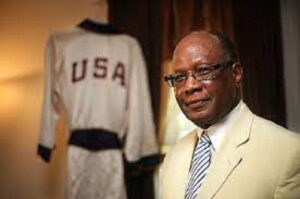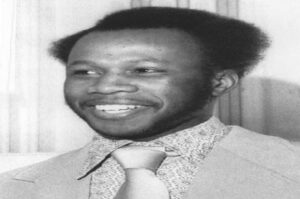Ringside Report Looks Back at Boxer Reginald Jones
By Donald “Braveheart” Stewart
In the UK there are some cities in the US which resonate. We know of the Streets of San Francisco, how the lights of Vegas keep a posse of famous looking CSIs busy and have multiple visions beamed across to our televisions of New York. We get Queens’, the Fort Apache nature of the Bronx and there is somewhere called 1PP but as for New Jersey and Newark…
We ain’t sure honey…
We know they exist and knowing what little we do about America, they shall be huge, significant and have a prominence in the local language that will signify more to natives than those of us “out the loop”. In 1951, future middleweight and Olympian, Reginald Dennis “Reggie” Jones, 16-10-1, 8KOs, was born into his family in Savannah, Georgia, but then his family moved to Newark, New Jersey. He was to go on and represent his country at the infamous 1972 Munich Olympics.
As a child he was an athlete. He played basketball and football (not real football where you play with the ball at your feet thus it being foot – ball which some call soccer, but the American variety of what looks like rugby, with rules for ad breaks and fading musical stars to resurrect their careers, often referred to as American Football in countries where they have real football…) and on the track.
Straight after High School Jones joined the military, serving in the Navy of his country and whilst stationed in Guantanamo Bay, Cuba, he took up the noble art of boxing. In Cali, in 1971, at the Pan American Games, he won bronze to add to the Marines and interservice titles he already held as well as two North Carolina AAU titles.
It led to his making the Olympic team of 1972 and in what must have been great excitement he left to represent his country.
We are now very aware of the corruption in Olympic boxing and many of us who comment upon the professional game are also very well versed in criticizing the judge’s score totals when we hear wide margins which are not backed up by any evidence. So, yet another “controversial” Olympic decision hardly registers.
In 1972, Jones went in for his fight against Valery Tregubov of the mighty Soviet Union. Just how corrupt the process was for Communist countries competing in international competitions was yet to be uncovered as we cooed over 16-year-old Soviet era gymnasts whilst East European swimmers were dopped up so much they could have opened up a drugstore out of their closets.
In boxing we know from recent reports that there has been widespread corruption. In the ‘70’s it may have gone beyond the doping, and even more than just offering “bribes” or inducements to judges. In some cases, there was blatant cheating where judges simply voted in favor of the Communist candidate – like a sporting version of a Communist election.
Now I cannot say that any of that happened when Jones stepped into an Olympic boxing ring in 1972 in West Germany, but he beat Valery Tregubov. The judges, however, did not rule in his favor. Tregubov was then the European amateur champion but lost his next fight against Britain’s Alan Minter. Minter won the bronze that Olympics. But for Jones, he was out the competition and the pinnacle of his career to date – the Olympics – over after one contest.
The following year Jones turned professional, winning his first fight on the 17th of January 1974 in North Bergen by stopping Carlos Stevens in the 4th round of a scheduled 6.
Like many Olympians, the professional game was an obvious choice, but the reality was that the professional code was different to the amateur one and expectations whilst rife that he would flourish, his 26 professional contests had a lowly win rate.
He tried twice for the New Jersey state championship at middleweight when he lost to an unbeaten Rusty Rosenberger on points on the 27th of April 1979, in Newark and then in 1981, the 18th of June, in Ice World Totowa against Bobby Czyz, when he was forced to retire at the 6th round – he was well down on the scorecards. His final fight in ’82 was another loss – to Bob Patterson – until he took a 4-year hiatus, returning to face John Elmore in 1986 in his final fight -which he also lost.
After boxing he became a social worker and a more apt profession after the ring, I cannot think of. After 31 years of working with young people and their families, he retired in 2016. It is a tale of how someone with high ambition was thwarted by the politics of the time, but his success may be more than the sport could give as he served not once, but twice for the community in which he’s settled, wherever the hell Newark, New Jersey or New York may be!
Click Here to Order Boxing Interviews Of A Lifetime By “Bad” Brad Berkwitt


